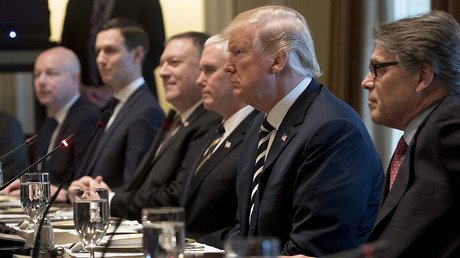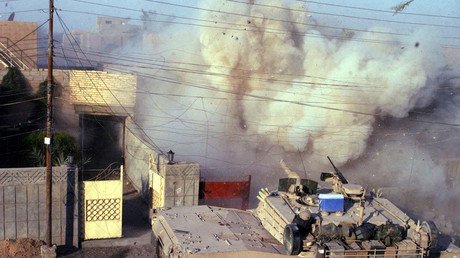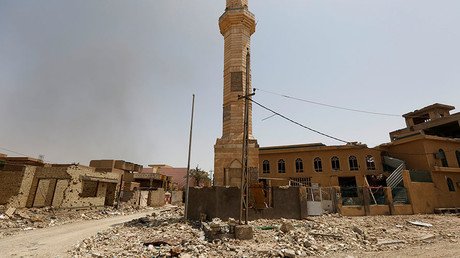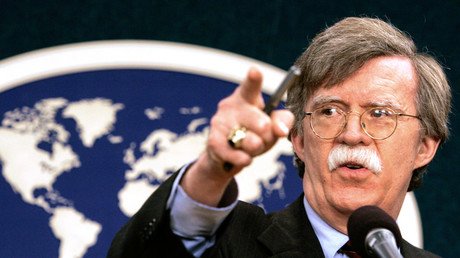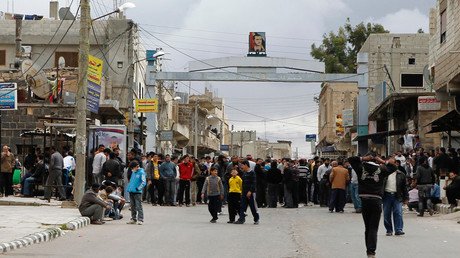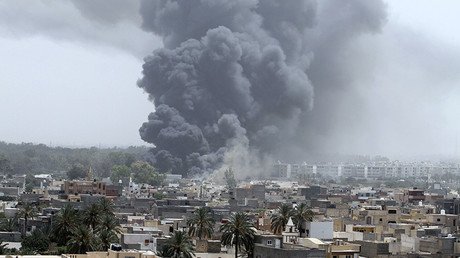How Iraq War destabilized the world and why the neocons aren't finished yet
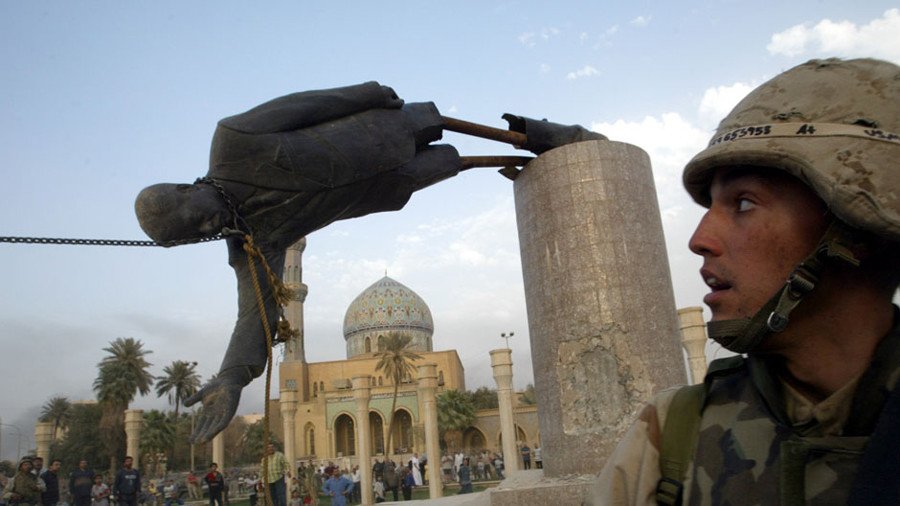
The Iraq War architects have been thoroughly rehabilitated and are planning their next adventure, even as the catastrophic ramifications of their crimes continue to reverberate around the world.
Last week marked the 15th anniversary of the American invasion of Iraq in 2003. April 9 will be the 15th anniversary of the fall of Baghdad. The consequences of these events are still playing out today, from Mali to Niger, to the Philippines. Iraq has never recovered and is only beginning to emerge from the trauma, while American officials plan the next military adventure.
Writing in the New York Times, Iraqi novelist Sinan Antoon observed: “The invasion of Iraq is often spoken of in the United States as a ‘blunder,’ or even a ‘colossal mistake.’ It was a crime. Those who perpetrated it are still at large. Some of them have even been rehabilitated thanks to the horrors of Trumpism and a mostly amnesiac citizenry.”
The rehabilitation of the neocons
Indeed, the rise of Trump has provided the cabal of Iraq War architects with a rebranding opportunity. After their utter failure in Iraq, these people were largely disgraced and no longer taken seriously outside of right-wing circles. But Trumpism, and the desire of liberals to oust the current president, has led to an anti-Trump coalition which includes at its helm many of the instrumental figures behind the Iraq invasion. The list includes David “axis of evil” Frum, former speechwriter to President George W. Bush and now a senior editor at the Atlantic, as well as neoconservative think tanker Bill Kristol, and George W. Bush, who is now celebrated as a pragmatic leader – even by nostalgic Democrats who contrast him with Trump.
Trump’s victory in the Republican primary on a seemingly isolationist platform, which was obviously a facade, sent many of these neoconservatives running toward Hillary Clinton, the Democratic nominee. Those who lined up behind Clinton have since been embraced by the Democratic establishment, while the more extreme neoconservative hawks who stuck by the Republican Party have effectively inserted themselves into the Trump administration. The most recent and terrifying of these is John Bolton, former US ambassador to the UN. Bolton played a key role in politicizing the intelligence that was used to mislead the public about weapons of mass destruction in Iraq. And now he is Trump’s national security advisor.
Bolton is a neoconservative extremist who has never seen a country he didn’t want to bomb. On the top of his hit list is Iran and North Korea, though Bolton has expended most of his energy agitating for the US to bomb Iran, which he seeks to hand over to the Mujahedin E Khalq (MEK), a cultish group of Iranian exiles that has received backing from Israeli intelligence and was formerly classified as a terrorist organization by the United States.
In light of the Iraq war anniversary and the recent appointment of Bolton, it’s a good time to survey the damage that neocons such as Bolton caused in Iraq. The war left an estimated 1 million Iraqis dead, 4.5 million displaced, 5 million orphaned, some 2 million widowed, and caused birth defects and cancer rates in some Iraqi cities that are significantly worse than those seen in the aftermath of the atomic bombings of Hiroshima and Nagasaki in Japan at the end of the Second World War.
But the destruction reaches far beyond just Iraq.
The new Jihad
The irony is that Trump’s rise to the presidency is in many ways the fault of the Iraq War architects. Their policies in Iraq, which were recycled in Libya and Syria, led to the rise of Islamic State and the refugee crisis that fueled right-wing populists such as Trump and his counterparts in Europe. The war in Iraq revived a jihadist movement that was dead after the first few months of the war on Afghanistan, opening the floodgates to jihadists and their supporters from around the world.
When the US dismantled the Iraqi state in 2003, instead of replacing it with a functioning government it punished Sunni areas and installed a sectarian Shiite regime comprised of exiles with no popular support in the country. The US essentially created a new category known as the Sunni Arab and, where the state collapsed, it was Al-Qaeda who would fight on their behalf. The inflammation of sectarian fears and lack of security resulted in a power vacuum that opened the floodgates to Al-Qaeda in Iraq and ignited a gruesome civil war. AQI eventually morphed into the Islamic State of Iraq. Before morphing into ISIS, ISI established an Al-Qaeda offshoot in Syria called Jabhat al-Nusra, the strongest and most disciplined armed opposition group in the country.
ISIS and Al-Qaeda groups cultivate and thrive off of stateless zones as well as a Sunni Arab victimhood narrative, which started with the execution of Saddam Hussein and has been propagated throughout the region by popular gulf-funded religious figures and media outlets such as Al Jazeera Arabic.
Beheadings became a hallmark of the Al Qaeda branch in Iraq under Abu Musab al-Zarqawi who, unlike Osama bin Laden began to focus on fighting the near enemy — the Arab dictatorships, secular people and minorities — as opposed to the far enemy of the infidel west. We would later see these beheadings in ISIS propaganda videos aimed at terrifying the west. There was a theory in the past in bin Laden’s era that you should fight the far enemy, the west, before the near enemy. But under this new and evolved Al Qaeda, whether in Iraq or Yemen or Mali, we saw local franchises focused on slaughtering their fellow countrymen, with particular genocidal hatred for Shias.
The American occupation of an Arab country fueled this Salafi jihadist movement on a global scale. The occupation led to sympathy for this Iraqi jihad throughout the Muslim world, which meant foreign fighters coming in and a huge amount of funding from the gulf.
This global war on terror framework was also implemented by the US in countries such as Somalia and Yemen and across North Africa as well.
The Iraq War gave us Donald Trump
In spite of America’s criminal disaster in Iraq, Barack Obama continued to implement regime change policies in both Libya and Syria by funding and arming right-wing insurgencies made up of none other than Al-Qaeda affiliates, the very ideology the US was supposedly fighting in its global war on terror. Like in Iraq, US intervention led to the rise of a failed state in Libya and in much of Syria.
In Syria, these failed state zones were then filled by thousands of foreign fighters coming in from the Turkish border, which the US tolerated as a means to put pressure on the Syrian regime, hoping the regime would offer concessions, which of course it never did. ISIS eventually took over many of these failed state areas and began kidnapping westerners and the group made millions of dollars in ransom money as a result.
The massive refugee flows which resulted from the US encouraging war and regime change in the Middle East led to the destabilization of much of Europe and to some extent, the rise of Donald Trump, who campaigned on the fear-mongering of ISIS, refugees and Muslims. You can trace all these and other terrible consequences to the US decision to encourage war and state collapse rather than to prioritize stability and order in the Middle East. It all started with the Iraq War.
The gift that keeps on giving
The ramifications of the Iraq War are still playing out today, having inspired Salafi jihadist movements from the Philippines to Mali and even Niger, where US soldiers were recently killed by jihadists.
Moreover, the war in Iraq, according to the very people who architected it, has strengthened Iran in the region. That isn’t necessarily a bad thing given that Iran and its partners, such as Hezbollah and the Iraqi Popular Mobilization Forces (PMF), were crucial to defeating ISIS in Iraq, Syria and Lebanon. But a strengthened Iran is a nightmare for the US as it threatens American, Saudi and Israeli hegemony in the region. So, the Iraq war planners are using the strong position of Iran – created by neoconservative policies – to push for a war with Iran. They’ve also expanded their hit list to include Russia, who they’re still hoping to escalate against in Syria.
With Bolton as Trump’s national security advisor, a war with Iran is now much more likely. For the war industry and the neocons who lobby for it, the Iraq war they started is the gift that keeps on giving.
The statements, views and opinions expressed in this column are solely those of the author and do not necessarily represent those of RT.

